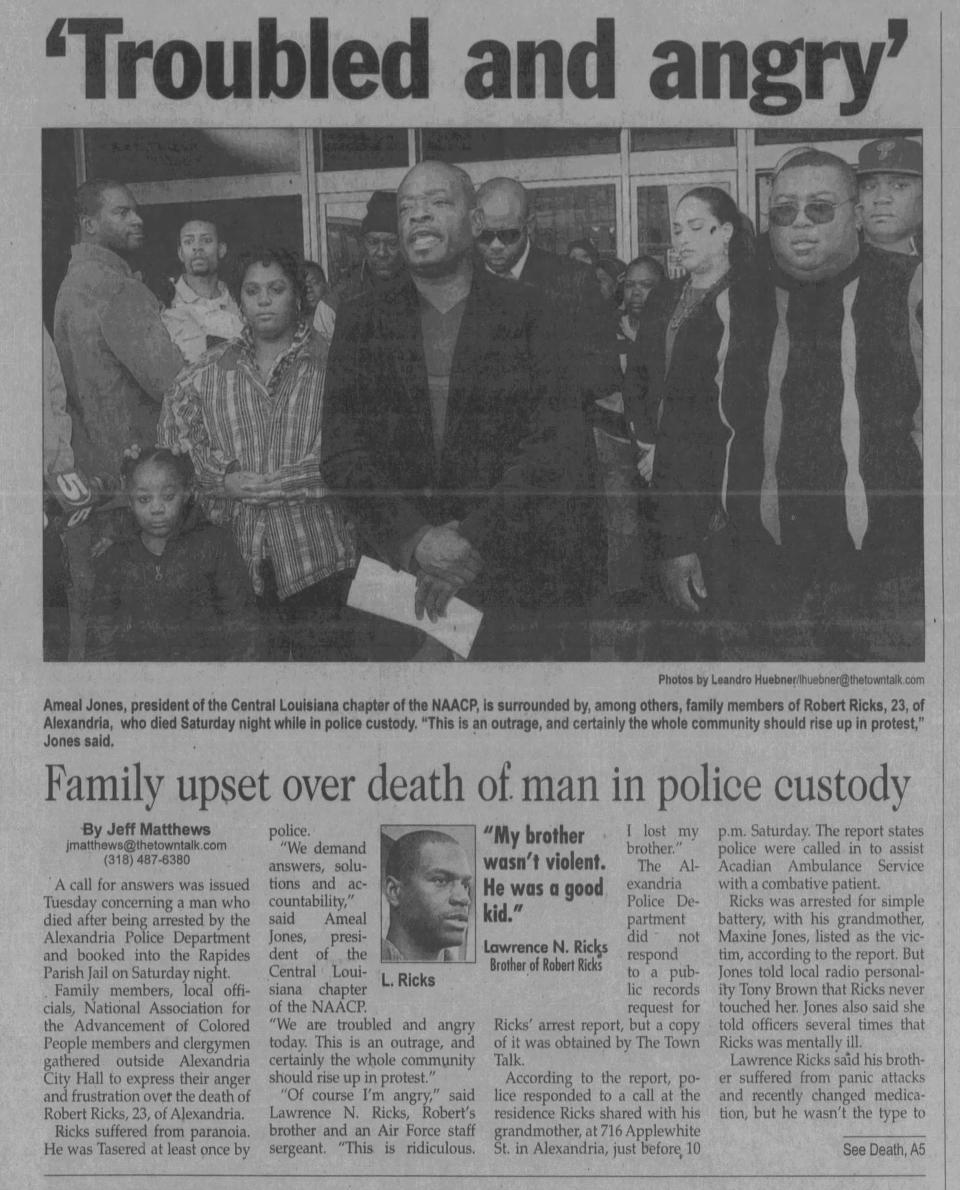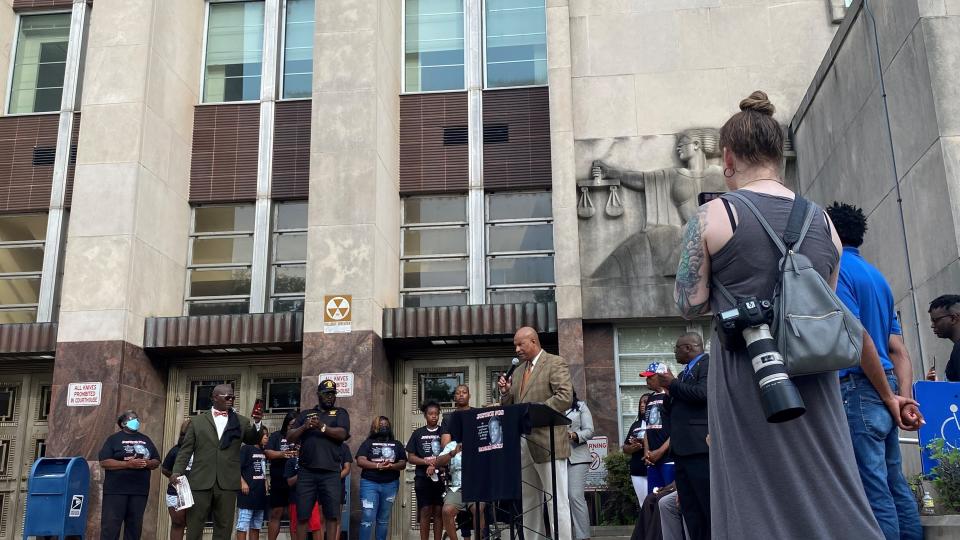11 years later, a video surfaces and galvanizes push to reopen police custody death case
The case of Robert Ricks, an Alexandria man who died while in police custody in 2011, has been given new life because of a video that was published on YouTube in late May.
Ricks was 23 when he died on Feb. 5, 2011. On Thursday, about 50 people gathered on the steps of the Rapides Parish Courthouse in downtown Alexandria to call for his death to be re-examined and for the resignation of Rapides Parish Sheriff Mark Wood.
Aftermath of a son's death
There was an uproar after Ricks' death. His family, clergy members and the Alexandria chapter of the NAACP gathered outside Alexandria City Hall days later to seek answers.
"We are troubled and angry today," said Ameal Jones, then the president of the NAACP chapter. "This is an outrage, and certainly the whole community should rise up in protest."
A coroner's report months later ruled the death accidental, stating Ricks' schizophrenia and an almost lethal level of cocaine he had ingested combined to cause excited delirium.
Ricks also had been diagnosed with bipolar disorder and had left a local treatment facility just two days before his death.
Ricks' father, Lawrence Ricks, filed a federal civil rights lawsuit only days before the one-year mark of his son's death. He named as defendants the Alexandria Police and Fire departments, Rapides Parish Sheriff's Office, Acadian Ambulance and Taser International Inc.,
Also named were public officials associated with those entities and officers and deputies who were involved.
Inmates plead: 3 plead guilty in 2021 Alexandria homicide cases; Teen fails to get bond reduced
Jail suicide: Parents of woman who died by suicide in Rapides jail file lawsuit
He alleged police used excessive force, denied his son medical care and alleged product liability regarding the Tasers used to shock him twice, as well as other claims.
But by the time attorneys gave their opening statements on June 2, 2015, to jurors in the federal courthouse in Alexandria, only Taser International remained as a defendant. The other parties either were released after filing motions for dismissal or the elder Ricks had agreed to release them.
In her opening statement, attorney Carol Powell-Lexing laid the blame for Ricks' death on a specific Taser model. She alleged that the excited delirium diagnosis had been invented by the company's own expert as a way to deflect blame.
The diagnosis does have its detractors and supporters. The American Medical Association cautioned in 2021 against accepting it, while the American College of Emergency Physicians and National Association of Medical Examiners do recognize it.

When Powell-Lexing and her team wrapped their case, Taser International attorneys asked U.S. District Judge Dee Drell to dismiss the case.
Ricks' father's attorneys had failed to show or even identify a manufacturing defect in the Taser model used on the man, they wrote in a motion for judgment as a matter of law.
Drell agreed and granted the motion with prejudice, meaning Ricks' case couldn't be filed in court again. Because Drell granted the motion, jurors never deliberated the case.
Video brings courthouse protest
The unidentified person who posted the almost 14-minute edited video to YouTube on May 23 wrote they got the footage from a friend who had left his job at an unidentified news station.
When the friend left, he took about 10 thumbnail drives that had been sent to the station with him, read the YouTuber in the video's description. The account, named Robert Ricks, only has one video.
"I looked up the case on Robert Ricks and apparently there is video here that was never released to the public," wrote the person. "The footage is rather old, but I hope the family gets justice."
Ricks' family since has asked the U.S. Justice Department to look into the case, according to KALB-TV.
At Thursday's protest, Pastor Randy Harris said the video shows Ricks' "murder," and he demanded all those officers and deputies who were involved in February 2011 "come forth and tell the truth."
Harris said the family and their supporters would be approaching Brandon Brown, the U.S. Attorney for the Western District of Louisiana, to present reasons they believe the case should be revisited.
Mental crises and police: As services are cut, police deal more with mentally ill
'Officer with a pin': Police train to de-escalate those suffering mental-health crises, other situations
"We're requesting, at the behest of the family, that they reopen the Ricks' investigation because we do not believe it was fair, nor do we believe it was impartial," he said.
Harris said the group is demanding justice for Ricks and others who have been harmed while in the custody of the sheriff's office. He called for Sheriff Mark Wood's resignation.
Wood was one of the deputies involved that night. The YouTube video claims Wood kicked Ricks in the head, among other things.
According to the elder Ricks' lawsuit and other legal filings, Wood had said he kicked Ricks on one of his shoulders as they tried to gain control of him.
He released a statement on June 14, stating "all facts were presented in federal court and a federal judge has ruled that no one did anything wrong in the handling of this matter."
Ricks' sister, Destiny Jones, reiterated that the family was seeking justice for anyone — no matter their race — who died or were harmed while in the sheriff's office's or any law enforcement agency's custody. She said they'd hold Wood and the Rapides Parish Police Jury accountable for that.
Alexandria City Councilman Gerber Porter said law enforcement needs to respond to mental-health calls with the right personnel.
"And sometimes that response is with force rather than with services," he said. "What we saw here in this case was the wrong persons trying to address an issue they were not prepared or qualified to address."

State Rep. Ed Larvadain III, District 26, said Ricks shouldn't be done and that all officers and deputies "dropped the ball" in dealing with him.
"The same problems that we're having with the sheriff's office, we have the same problem with state police," he said.
It's costing the state millions of dollars and the lives of people, said Larvadain. He asked U.S. Attorney Brown to look at the case and said those with mental-health issues cannot be treated like any other person.
Proper protocols must be in place, he said.
"We're asking the sheriff to do what's right, get out the way ... This family needs closure," said Larvadain. "There was no need for the person to die just because they were sick and had a seizure."
This article originally appeared on Alexandria Town Talk: YouTube video 11 years after Robert Ricks' death prompts call for probe

